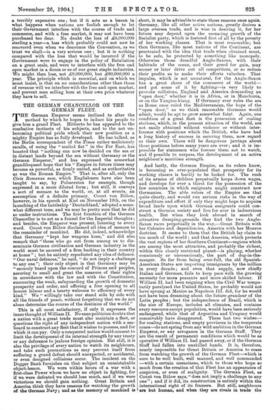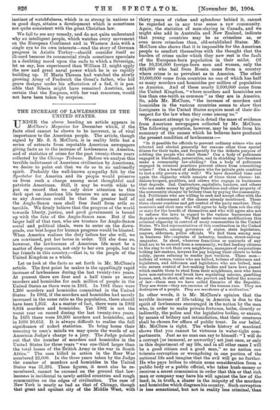T HE German Emperor seems inclined to alter the method by
which he hopes to induce his people to give him a grand Fleet. Hitherto he has appealed to the combative instincts of his subjects, and to the not un- becoming political pride which their new position as a mighty Empire has so fully developed. He has talked, as the Berlin correspondent of the Times rather maliciously recalls, of using the " mailed fist" in the Far East, has boasted that " nothing can now be decided on the sea or in distant lands beyond the sea without Germany or the German Emperor," and has expressed the somewhat grandiloquent hope that his " Empire in future times may become as powerful, as firmly united, and as authoritative as was the Roman Empire." That is, after all, only the Civis Roman= sum, which Englishmen have also been taught to say, by Palmerston for example, though expressed in a more diluted form ; but still, it conveys a sort of menace to the world, or, at all events, an assumption of a definite primacy. Count von Billow, however, in his speech at Kiel on November 19th, on the launching of the battleship Deutschland,' adopted a some- what different tone, and we may be pretty sure that he did so under instructions. The first function of the German Chancellor is to act as a funnel for the Imperial thoughts ; and besides, the Emperor was present, listening to every word. Count von Billow disclaimed all idea of menace to the remainder of mankind. He did, indeed, acknowledge that Germany "kept her weapons keen," and did also remark that " those who go out from among us to dis- seminate German civilisation and German industry in the world must be assured of a firm backing in their country at home " ; but he entirely repudiated any idea of defiance. " Our naval defences," he said, " do not imply a challenge to any one "; their only object is that Germany may be " securely based upon the concord of Princes and peoples, assuring to small and great the measure of their rights in accordance with the law and with the Constitution, succouring the weak, safeguarding the growth of domestic prosperity and order, and offering a free opening to all honest labour and a hearty welcome to efficiency of every kind." We " willingly take our stand side by side with all the friends of peace, without forgetting that we do not alone determine the course of the destinies of the world."
This is all most satisfactory, if only it expresses the inner thought of William II. No sane politician doubts that a nation with a great trade must also maintain a fleet, or questions the right of any independent nation with a sea- board to construct any fleet that it wishes to possess, and for which it can pay. Only a conquered nation would consent to limit the development of its internal strength by any treaty or any deference to jealous foreign opinion. But still, it is also the privilege of every nation to watch its neighbours, and take such precautions as may prevent itself from suffering a rand defeat should unexpected, or accidental, or even designed collisions occur. The incident on the Dogger Bank furnishes on that subject an unmistakable object-lesson. We were within hours of a war with a first-class Power whom we have no object in fighting, for if we were defeated we should lose much, and if we were victorious we should gain nothing. Great Britain and America think they have reasons for watching the growth of the German Navy; and as the memory of mankind is short, it may be advisable to state those reasons once again. Germany, like all other active nations, greatly desires a large oversea trade, and is wise in desiring it, for her future may depend upon the menacing growth of the Socialist party, which is fostered first of all by the poverty of her working classes. That is most reasonable; but then Germans, like most nations of the Continent, are penetrated with the idea that trade when obtained must, to be safe, be protected by something like monopoly. Otherwise those dreadful Anglo-Saxons, with their habitude of the ocean, and their greed for gain, may sooner or later drive out all competitors, or so reduce their profits as to make their efforts valueless. That impulse, which is not unnatural, for the Anglo-Saxon has a great share of the commerce of the world— and got some of it by fighting—is very likely to provoke collisions, England and America demanding an ' open door," whether it is in Africa, or in Manchuria, or on the Yangtse-kiang. If Germany ever rules the sea as Rome once ruled the Mediterranean, the hope of the " open door," as we think reasonable Germans would admit, would be apt to grow somewhat faint. Again, one condition of a great fleet is the possession of coaling stations, which, in the present situation of the world, are not easily obtained without violence or without inter- ference with positions which the British, who have had a long history of success in securing them, now regard as their own. There will be dangerous jarrings about those positions before many years are over ; and it is im- possible for statesmen who foresee them not to watch, and if possible to surpass, the development of an active neighbour's maritime strength.
And lastly, the German Empire, as its rulers know, is becoming so over-populated that prosperity for its working classes is hardly to be looked for. The rush of its armies of children perpetually keeps down wages, and develops for ever a thirst for the possession of the few countries in which emigrants might construct new G-ermanies. The able rulers of the Empire see that quite clearly, and would run serious risks in the way of expenditure and effort if only they might hope to acquire broad lands upon which German emigrants could con- struct a German society and live for ever in industrious health. But when they look abroad in search of attractive dumping-grounds they find the two Anglo- Saxon races perpetually in the way,—Great Britain with her Colonies and dependencies, America with her Monroe doctrine. It seems to them that the British lay claim to too much of the world ; and that America, which protects the vast regions of her Southern Continent—regions which are among the most attractive, and probably the richest, within this closely restricted planet—is playing, whether consciously or unconsciously, the part of dog-in-the- manger. So far from being over-full, the old Spanish- American States are importing immigrants by the million in every decade ; and even that supply, now chiefly Italian and German, fails to keep pace with the growing necessity for more peasants and more skilled labour. If William II. had been reigning when the Civil War tempo- rarily paralysed the United States, he probably would not have sprung at Mexico as Napoleon III. did, for he would not have been dreaming about the future grandeur of the Latin peoples • but the independence of Brazil, which is the size of Europe, includes all climates, and contains every resource except population, would have been seriously endangered, while that of Argentina and Uruguay would conceivably have disappeared. These last two wishes— for coaling stations, and empty provinces in the temperate zones—do not spring from any wild ambition in the German Emperor, or any arrogance in the German Staff. They are the result of permanent conditions which would be as operative if William II. had passed away, or if the German Staff had fallen into unskilled hands. It is, therefore, nearly impossible for Great Britain or America to cease from watching the growth of the German Fleet—which is sure to be well built, well manned, and well commanded —with a certain uneasiness, which to those who hope so much from the creation of that Fleet has an appearance of suspicion, or even of malignity. The German Fleet, as Count von Billow say s," does not imply a challenge to any one" ; and if it did, its construction is entirely within the international right of its framers. But still, neighbours are but human, and when they are rivals in trade the We fail to see any remedy, and do not quite understand why an intelligent people, which watches every movement on the European Continent and in Western. Asia with a single eye to its own interests—read the story of German progress in Asiatic Turkey—should consider itself so ill-used because its commercial rivals sometimes speculate in a doubting mood upon the ends to which a Sovereign, let us say, less experienced than William II. might apply the new and great naval power which he is so rapidly building up. If Maria Theresa had watched the slowly growing Army of Frederick the Great's father, who hid grave designs under his affectation of a fad, it is pos- sible that Silesia might have remained Austrian, and certain that the Empress, with her vast resources, would not have been taken by surprise.















































 Previous page
Previous page